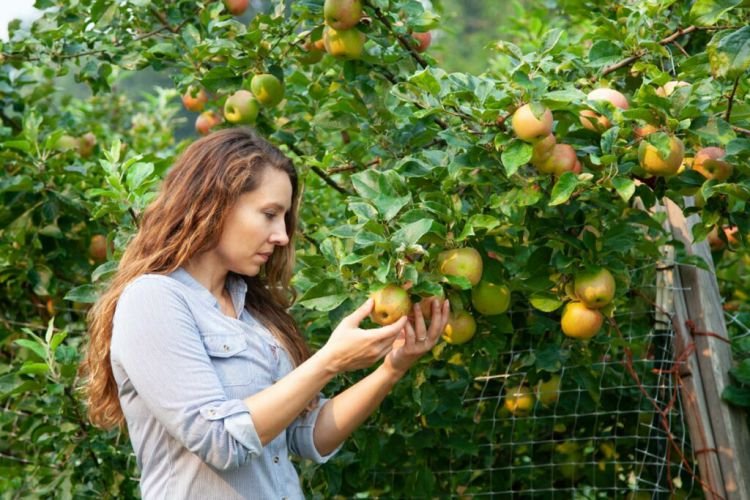 A fruit tree is one of the most versatile and beautiful types of plants you can have in your garden, and they’re easy to grow too! Whether you want to go with an apple tree or something more exotic like a mango tree, there are plenty of fruit trees on sale from which to choose. Of course, not all trees are created equal; some varieties are easier to grow than others and might even produce fruit faster than others, so this guide will highlight 5 of the best fruit trees for sale that are also extremely easy to grow!
A fruit tree is one of the most versatile and beautiful types of plants you can have in your garden, and they’re easy to grow too! Whether you want to go with an apple tree or something more exotic like a mango tree, there are plenty of fruit trees on sale from which to choose. Of course, not all trees are created equal; some varieties are easier to grow than others and might even produce fruit faster than others, so this guide will highlight 5 of the best fruit trees for sale that are also extremely easy to grow!
1) Victoria plum trees
Victoria plum trees are an excellent option for those looking for an easy-to-grow fruit tree. The trees are self-fertile, meaning you only need one tree to get fruit. They’re also disease-resistant and tolerant of cold weather, making them a low-maintenance option. Victoria plum trees produce large, sweet plums that are perfect for eating fresh or using preserves. You can find Victoria plum trees for sale at most nurseries and garden centers. Plant the tree in full sun, spacing it about 300 cm from other plants. Keep the soil moist but not soggy by watering deeply once a week; water shallowly daily during dry spells. You can also use 20-24″ container pots with a layer of mulch on top to grow your own plums. With proper care, these trees will bear fruit within 3- 6 years and be ready for harvest just before the first frost.
What’s more? The fruits are Oval light red over yellow skinned with green stripes and a taste similar to cherry, apricot, and peach. You might have heard that the fruit is poisonous due to cyanide content but don’t worry! According to a study, the Victoria plum tree contains traces of amygdalin (also known as laetrile), which is found in many foods, including apples, almonds, peaches, and persimmons. Their seasons vary from late August to mid-September, so check if your area has winters that last longer than 4 months.
2) Shropshire Damson trees
These hardy varieties are sharper and smaller than the other fruit trees. They can be eaten when green or ripened or used in making jams. The Shropshire Damson tree is also referred to as ‘Prune’ Damson because of its shape. It’s a lovely but small-sized fruit with a tart taste. It’s also Self-fertile, so no cross-pollination is required, so you’ll get more fruit from each plant. Many people choose this type of tree if their garden is limited in space.
What’s more? The tree is also dwarf, meaning it won’t grow too tall. To produce high yields, make sure the soil has enough nitrogen levels and not too much phosphorus. Some water will also need to be applied during dry periods to produce well-formed fruits. The 24″ container may be enough to house this pretty little fruit tree! If you’re looking for a self-fertile fruit tree, then the Shropshire Damson tree is a good choice. As long as there’s enough water given throughout the year, your new friend should be able to produce plenty of juicy fruit!
3) Blue Tit dwarf Pixy
One of the best fruit trees for sale that is easy to grow is the Blue Tit dwarf Pixy. This tree is perfect for small gardens and patios as it only grows to around three meters tall. The Blue Tit produces white flowers in the spring, which turn into small, deep blue people fruits in the summer. These fruits can be eaten fresh or used in jams and pies. You can maintain the height of Blue Tit dwarf Pixy at 180 cm by trimming new growth if you don’t want your tree to get taller. The main issue with this tree is that the branches often break during winter, so care needs to be taken when putting up Christmas lights.
What’s more? The ripening happens the first week in August. They’re also Self-fertile, meaning they produce fruit without cross-pollination. And a single tree will yield hundreds and thousands of fruit over its lifespan! For these reasons, the Blue Tit dwarf Pixy is an excellent choice for those looking for a healthy, delicious fruit that doesn’t require too much work.
4) Stella dwarf Gisele cherry tree
This is a popular fruit tree because it grows well and produces many cherries. It’s also relatively inexpensive, so this tree is an excellent choice if you’re looking for a fruit tree that won’t cost too much. The dwarf Gisele 5 stock cherry tree is easy to grow with low maintenance requirements. To get the most out of your cherry harvest, prune in the early spring before new growth begins. You can also do light shaping after the blooming season in the summer or fall but not during the growing season when the plant needs all its energy for fruiting. You can maintain the tree at 150 cm in height by regularly cutting off the branches’ tops. If your tree becomes overgrown, you may need to cut back more aggressively than just trimming off occasional branches. Make sure you water during dry spells, as plants need water and nutrients for the healthy production of fruit.
5) Peregrine Peachtree
If you’re looking for a fruit tree that’s easy to grow and produces delicious fruit, the Peregrine Peachtree is a great option. This tree is relatively disease and pest-resistant, producing large, juicy peaches that are perfect for eating fresh or using recipes. The Peregrine Peachtree is also drought-tolerant, so it’s an excellent choice for those who live in dry climates. The tree can grow up to 300 cm in height and has an average lifespan of 12 years. For best results, plant your peach tree in full sun and keep it well-watered. It’s worth noting that this tree requires cross-pollination with another peach tree to produce fruit (although there are varieties available that do not require cross-pollination).
Where to Buy the Right Fruit Trees
When looking for fruit trees for sale, finding a reputable dealer is essential. There are many sources on the internet, but not all of them will offer the best quality product. One great option is https://www.chrisbowers.co.uk/ which provides a variety of fruit trees for sale at competitive prices. The company ships its products anywhere in the world and provides instructions for easy planting. They also have a wide selection of fruit tree seeds for people who want to grow their plants from scratch. If you are unsure about which kind of fruit tree to purchase, don’t worry! Chris Bowers has an excellent customer service team that can help guide your purchase.
Conclusion
In a nutshell, choosing the best fruit tree for your needs can be done by evaluating where you live and what types of fruit trees grow in your area. Once you have done this, you can select the perfect fruit tree. The rule of thumb is to buy from the right dealer – always consult with an expert if you don’t know what’s best for your environment – make sure it’s grown organically. With these tips, you’ll be well on finding the perfect fruit tree!




